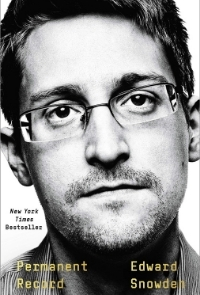
Permanent Record
Written by: Edward Snowden
Reviewed by: Rob Leicht
Genre: Autobiography
Score: 4.5/5
Arguing that you don’t care about the right to privacy because you have nothing to hide is no different than saying you don’t care about free speech because you have nothing to say. – Edward Snowden – Permanent Record
By now we are all familiar with Edward Snowden and the government documents that he turned over to the press in 2013. We have heard his story in many permutations—the government version, the press version, the Hollywood version, etc. But we haven’t heard the story from the man himself, until now. Permanent Record does not contain any bombshells or new revelations, and if that is what you are expecting then you are likely to be disappointed. This book is about more than that. It is how the act came to be, the choices, the ethics, the technology, and, most importantly, the people.
The first 100 pages are devoted to Snowden’s childhood growing up on the internet, his family and school life, and on through his brief stint in the military. While this part is undoubtedly slower than the rest, I still enjoyed it, as it lays the foundation for the personal growth and development that Ed undergoes throughout the course of his life and subsequently this book. From the shy and nerdy kid, to teenage hacker, to succumbing to nationalistic urges in the wake of 9/11, to his rise through the intelligence community, to realizing the Constitution he swore to defend is being trampled upon by the very government he works for, this a character arc that any fiction writer should be jealous of.
Parts Two and Three start strong and never let up. Beginning with Snowden’s initial government work and detailing his climb up the ladder of the CIA and NSA, the reader is able to follow along with Ed’s decision making process as he fights with his conscience every step of the way. The descriptions of how he gathered the documents on government abuses and ferreted them out of the secure NSA facility (flash drives, old computers, Rubik’s Cubes, and a lot of time) are extremely fascinating. In some ways the writing of this book took just as much courage as the act of whistleblowing itself, and the result is an immensely readable memoir.
None of the government abuses described in Permanent Record are new to me, but, even so, never before has a book made me feel so violated. I have never before so violently fought the urge to delete all of my social media and destroy my phone with a hammer. The impact of Snowden’s words can partially be attributed to the style in which he writes. He writes in a way that is neither dumbed down nor needlessly technical and is often conversational in tone, as if listening to an acquaintance tell stories. When Snowden does dive into the heavier technologies related to spy craft, he manages to keep the information relatable without losing any meaningful details.
The amount of government incompetence, negligence, corruption, and abuse detailed in Permanent Record is staggering. We live in a militarized police state where the government demands obedience and punishes resistance. If you think things have changed or improved, that these government abuses have ended since Snowden’s revelations, you are mistaken. Freedom is privacy, and we have neither.
Edward Snowden is an American hero, and I truly hope that the history books are kinder to him than the present.
Recent Comments